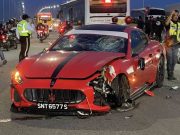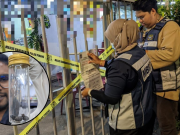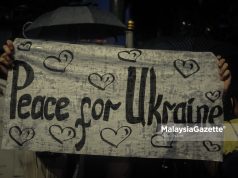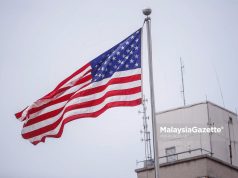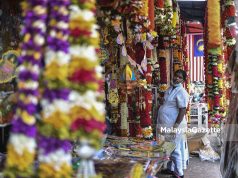The following article is submitted to the Editorial of Malaysia Gazette by reader, Arveent Kathirtchelvan.
Over the past week, we have seen tremendous protests involving the workers of J&T Express, a parcel delivery services company, specifically in Perak. The reason for these protests were apparently due to pay disputes, affecting commissions for the riders which saw a huge decrease and bonuses. In any case, the particulars of the protests were overshadowed by videos showing workers deliberately damaging parcels to sabotage the company.
This act divided Malaysians with most turning their backs to the protest due to what they saw as a destruction of property of innocents. A smaller group of Malaysian leftists correctly saw this act of sabotage as a positive development, recognising the weakness of the workers having next to nothing from the company to sabotage as even the motorcycles they rode were self-owned. Hence, targeting the bottom-line of the company through deliberate sabotage would prompt quicker action from the part of management to negotiate better terms.
Let’s take a minute to analyse further. We are in a seemingly everlasting pandemic with many workers being laid off. The unemployed labour pool is large with markedly fewer job opportunities, hence the demand for the rider work is high. Workers who protest understand that their position is extremely weak and they can be replaced very easily, what more such independent contractors with little ties to their company such as these riders. At this point, workers who protest quietly can easily be silenced, replaced and forgotten. Workers who are loud, boisterous and take radical action as sabotage force their issues further. Now with those viral videos, the workers of J&T have successfully made the whole of Malaysia see their suffering.
However, many netizens decried their actions as too violent or taking things too far. They argue that workers should have just had a peaceful strike without damaging customers’ parcels. Some even brought up how bus drivers in Japan still drove their route but collected no fares to hurt their companies but not the passengers. This breaks down when we realise riders are often not the ones who handle payment. That has already been taken care of. If they deliver the packages anyway, there is no point to the protest as their job role is fulfilled. So, they can’t continue delivery, nor can they just stop delivery as they are easily replaced. What are they to do?
In this juncture we must realise protests and strike actions are shows of force. They are inherently violent. What is represented by a show of many people getting together and putting forward demands is that if those demands are not met, violence would ensue. There are no philosophical undercurrents that would suddenly make the capitalists realise their error, simply the threat to their rice bowls, property and, sometimes, health. That is what a protest is and how protests came to be in the first place. Large groups are gathered to show that the sheer number of people of one mind can cause a lot of damage, as can be seen from revolutions. So, the understanding of “peaceful” protests should be tempered with this fact. Protests are protests, strikes are strikes. They are not gatherings, they are a show of threat against inflicted violence.
Here we can see the underlying contradiction of society which ignores many instances of violence and blows up over many others. This is a subtle illusion propagated by capital owners to distract the masses from the suffering caused by them. In the J&T case, the main propagator of violence was the company itself. Unilateral decisions to cut salaries are violent actions too. It completely disempowers workers and takes way not only their autonomy, rather hurts them the most, in one fell swoop stripping their ability to provide for their families with no chance for redress. That is violence.
Underpaying workers in the first place with wages that cannot sustain their livelihoods is violence. Overworking workers during their free time and the weekends is a form of violence. Yet the capitalists repackaged this as hustle culture. Making it so that workers cannot strike or form unions, destroying whatever union is formed like UEM-Edgenta tried to do through nefarious means such as harassment in the workplace is violence. Yet none of these enrage Malaysians as much as a few packages being thrown about?
What we need to realise is capitalist society bases itself upon the exploitation of and expression of violence against the working class. Workers who exert labour to create capital get that capital stolen away from them by wealthy capitalists who own the means of production, getting left with crumbs as remuneration. What is the basis for this other than the continuation of the exploitation started during feudal times by land barons against peasants? Let us not forget that the way these barons kept peasants in their place is through the threat of violence by many of their hired guns. In today’s society, the capitalists as descendants of these barons influence the law to side with them and utilise the state’s hired arms in the police force to enforce them. That’s how we get labour laws that practically disallow striking and only cover a small percentage of workers.
The retaliation of workers against this exploitative behaviour manifests itself in multiple ways, either actively or passively. Passive retaliation includes leaving their jobs, not trying as hard to perform in their roles and even engaging in corruption. This type of passive sabotage often results in the worsening of labour conditions but is a much safer act to perform. Active retaliation includes protest actions as above, which are much more dangerous acts for the workers themselves as they may face expulsion or criminal charges but done correctly and consistently, usually results in a positive change.
Going beyond the employee-employer relationship, the tenant-landlord relationship is the same, with landlords cutting electricity, water and other amenities to their tenants for failure to pay rent due to losing their jobs in a pandemic. Plantation workers who were promised housing once their years of service are done have been cheated out of that promise when the land is sold to another entity which doesn’t recognise the original promise. Whatever ramshackle house built by the plantation workers are then demolished. All of this with the support of the police. Violence.
In this reality, then, what is peace? We saw and chanted along to the Black Lives Matter protesters when they said “No Justice, No Peace”. Yet we must realise there are two meanings to these words. One, so long as there is no justice against the violence committed, peace will be disrupted. However, the more important understanding is that there never was any justice and there never was peace in the first place. Between peace and violence, the former is an illusion for those of us who have been sung lullabies by capitalists and their cronies so that we do not stand in solidarity with those who are suffering, thereby understanding that we ourselves are suffering too. Fighting against this insidious status quo requires the exertion of violence by a united working class. This deserves our support and solidarity.
Arveent Kathirtchelvan is a Committee Member of Pemuda Sosialis, Parti Sosialis Malaysia
Editorial note: The views expressed are those of the author/contributor and do not necessarily represent the views of Malaysia Gazette
Read More:
Netizen Berang Lihat Pekerja Syarikat Kurier Baling Parcel #MGFlash
Syarikat kurier baling barangan pelanggan diberi amaran keras


